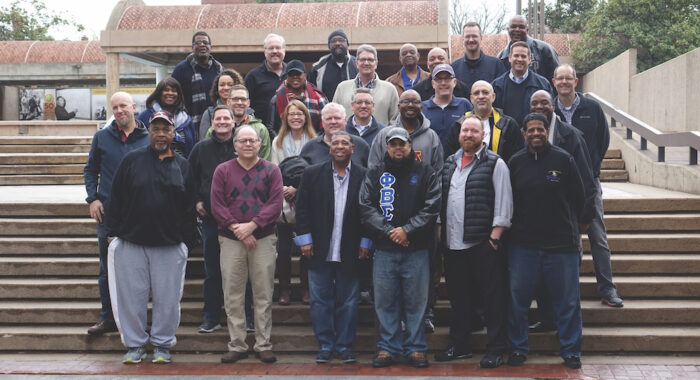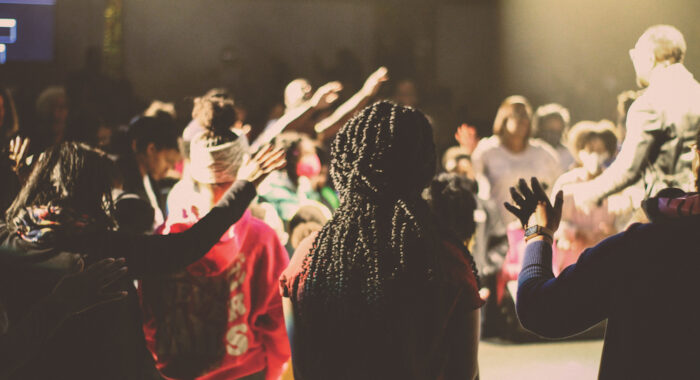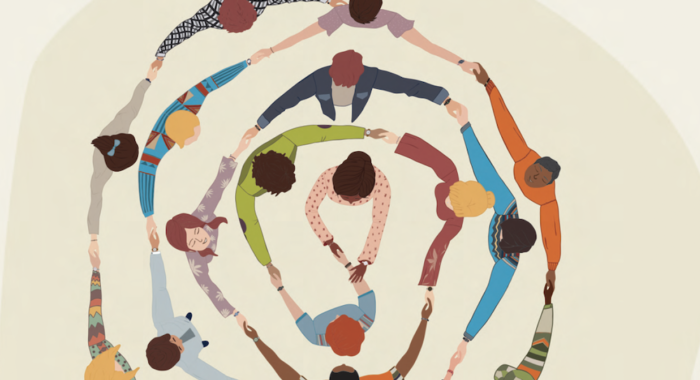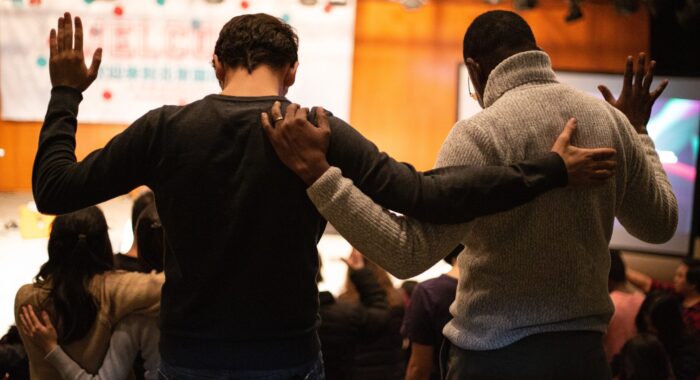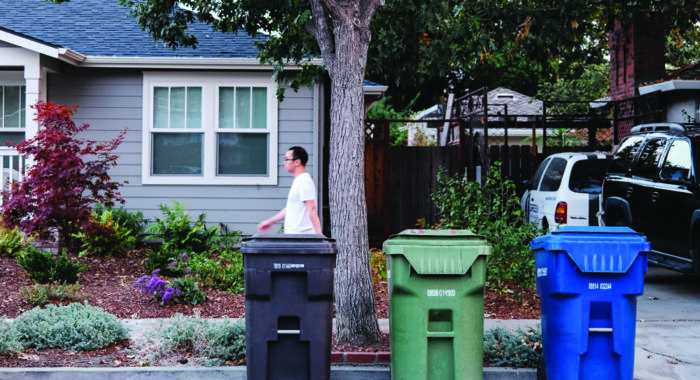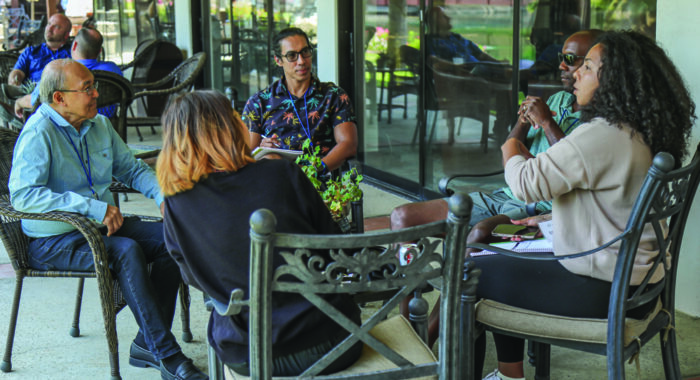“What does that mean?”
My 8-year-old held a bracelet she’d found at school. Stamped on its rim were three words: “Love Is Love.” On our drive to church, we pass a hair salon, its windows filled with posters of George Floyd and massive, multicolored wings proclaiming, “Trans Lives Matter,” “Black Lives Matter,” “Love Is Love,” “Better Together.” Across our neighborhood, yard signs declare,
In this house we believe that:
- Black Lives Matter
- Love Is Love
- Women’s Rights Are Human Rights
- We Are All Immigrants
- Diversity Makes Us Stronger
Signs like this sketch out a secular creed or statement of belief. It centers not on God, but on diversity, equality and everybody’s right to be themselves.
Seeing signs like this, Christians tend to grab hammers. Some grab one to drive the sign into their lawn. They lament racial injustice, they believe in diversity, they know women are equal to men, and they’ve been taught that affirming gay relationships, trans identities, and pro-choice positions comes part and parcel with these other things. If Black lives matter (which they surely do), then love of all kinds must be love. Others take up hammers with a different plan.
Knowing that the Bible rejects some things that underlie this modern creed, they swing a hammer to flatten the sign. Perhaps not literally, but in their hearts and minds. If these ideas stand together, they must all be wrong.
Offering Another Approach
We must offer a third approach. Wielding a marker instead of a mallet, we need to consider five contemporary claims: “Black Lives Matter,” “The Gay-Rights Movement Is the New Civil-Rights Movement,” “Love Is Love,” “Women’s Rights Are Human Rights,” and “Transgender Women Are Women.” Examining each claim through the lens of Scripture and in light of culture, we need to disentangle ideas Christians can and must affirm from ideas Christians cannot and must not embrace. But to wield the marker well, we must get down on our knees.
First, we must recognize that the tangling of ideas in the secular creed has been driven not only by sin in the world out there, but also by sin in the Church in here. We must fall to our knees and repent. The frequent failure of Christians to meet biblical ideals of fellowship across racial difference, equal valuing of men and women, welcome for outcasts, love for those with unfulfilled desire, and care for the most marginalized has allowed this mixture of ideas to coalesce under the banner of diversity. But with our heads bowed to the earth, we’ll see that the very ground in which the yard sign stands is unmistakably Christian. Clear that Christian soil away and you won’t find solid, secular rock. You’ll find a sinkhole.
To our 21st-century, Western ears, love across racial and cultural difference, the equality of men and women, and the idea that the poor, oppressed and marginalized can make moral claims on the strong, rich and powerful sound like basic moral common sense. But they are not. These truths have come to us from Christianity. Rip that foundation out, and you won’t uncover a better basis for human equality and rights. You’ll uncover an abyss that cannot even tell you what a human being is. Like cartoon characters running off a cliff, we may continue a short way before we realize that the ground has gone from underneath our feet. But it has gone. Without Christian beliefs about humanity, the yard sign’s claims aren’t worth the cardboard on which they are written.
So, when we pass these signs, I tell my children that in our house we believe that Black lives matter because they matter to Jesus. We don’t believe that love is love but that God is love, and that he gives us glimpses of his love through different kinds of relationship. We believe women’s rights are human rights, because God made us — male and female — in his image; and for that same reason we believe that babies in the womb have rights as well. We believe God has a special concern for single mothers, orphans and immigrants, because Scripture tells us so again and again. And we believe that diversity does indeed make us stronger, because Jesus calls people from every tribe and tongue and nation to worship him as one body together.
If you’re a follower of Jesus, I hope you’ll be ready to join with the call to loving arms. If you’re not yet following Jesus, or if you couldn’t imagine ever wanting to, I hope you’ll see the moral soil on which you stand is more Christian than you realize. And I hope you’ll start to wonder if the poor, first-century, brown-skinned, Jewish man known as Jesus of Nazareth — who lived as a member of an oppressed ethnic group and died at the hands of an imperial regime — might truly be the Savior of the world: the one who showed us what love is by laying down his life for us (1 John 3:16).
Call to Loving Arms
I didn’t need a car in London. But when we moved to America, my husband taught me to drive on the manual-shift car he’d bought second-hand at age 16. I struggled to learn when to change gears. I’d start in first and accelerate until the car was pleading for second. Focused on the road ahead, I’d miss the tell-tale sound. “Can’t you hear it?” Bryan would ask. I’d rush to switch from accelerator to clutch, grab the gear stick, pull it back, and slide it across so I could push it forward again into second. And so we’d go on, until the car was crying out for third.
Perhaps, like me, you’re a follower of Jesus, and you want to keep your foot on the gas. There is so much that we Christians need to do, and so far we need to go to see people from every tribe and nation won for Christ. But after 12 years living in America, I’m convinced that in order to make progress we must change gears. Rather than just ramming our foot down, we must pull the gear stick back and do the hard work of repentance before shifting into second or third.
In particular, white Christians like me must recognize the ways in which our tribe has been complicit in the pain of Black Americans: from slavery to segregation to racial inequality today. We might worry that proclaiming “Black Lives Matter” affirms a broader progressive agenda that also celebrates LGBT+ identities. But what if our failure to fight for racial equality while also upholding biblical sexual ethics allows that progressive wedding of ideas to stand unquestioned? If we don’t fight for the biblical goals of racial justice and equality, we’re playing into the script that says Christian sexual ethics come bundled with oppression. In order to make progress, it’s vital that we unyoke these ideas. To show where progressives are wrong, we must also freely acknowledge where they are right.
Whatever our racial background, we Christians must also repent of the ways we’ve allowed actual homophobia — fear, hatred and mistrust of gay and lesbian people — to infect our churches. Too often, LGBT+ people outside the Church have only heard a message of hate. Too often, we’ve left our same-sex-attracted siblings within the Church shivering in the dark, believing they’re unwanted and unloved. If you want to pour lighter fuel on sexual temptation, you leave someone alone. But if we want same-sex-attracted Christians to thrive, we must embrace them with loving arms. This doesn’t mean affirming same-sex romance. It means obeying the Bible, which calls us to bear each other’s burdens (Galatians 6:2) and to love each other deeply (1 Peter 4:8). What’s more, in a world in which people block their ears to the gospel because they think we’re homophobic bigots, the faithful, same-sex-attracted Christians in our congregations are a God-given SWAT team to burst through those defenses. There is no more powerful way to testify to Jesus in this generation than to turn away from sexual and romantic fulfilment because you believe in a better love.
We must also acknowledge the ways in which we’ve failed to follow Jesus in his treatment of women. Rather than sidelining women, we must celebrate women’s gospel ministry, cultivate women’s theological growth and encourage women as they serve the Lord whether in the home or in the workplace. In a world where women are pushed into commitment-free sex, the counterculture of the Church should affirm both marriage and singleness as compelling options for Christians, rather than making women who aren’t married or don’t have children feel marginalized. And against the history of shaming women for having babies outside of marriage, our churches should validate women who have chosen to keep their baby against all social pressure to abort, and offer the extended family and practical support that single mothers need.
On all these fronts, we must fight hard with the weapon God has given us: self-sacrificing, unrelenting love. Rather than shouting progressives who seek love and justice down, let’s call them in with a Jesus song: his song of good news for the historically oppressed, his song of love across racial and ethnic difference, his song that summons men and women, married and single, young and old, weak and strong, joyful and hurting, rich and destitute, into eternal love with him. Let’s fight with love and sing the song with which we’ll one day overcome.
This article was adapted from Rebecca McLaughlin’s book The Secular Creed and is used with permission of The Gospel Coalition.
Watch Rebecca's Session at Flourish ![Arrow]()
Rebecca McLaughlin is an author and speaker. Her first book, “Confronting Christianity: 12 Hard Questions for the World’s Largest Religion,” was featured on the TED summer reading list and named “Book of the Year” by Christianity Today. McLaughlin’s other books include: “10 Questions Every Teen Should Ask (and Answer) About Christianity,” “The Secular Creed,” and “Is Christmas Unbelievable?” She was previously vice president of content at The Veritas Forum and is co-founder of Vocable Communications. McLaughlin holds a theology degree from Oak Hill College in London and a Ph.D. in English literature from Cambridge University.




 View All Articles
View All Articles 











